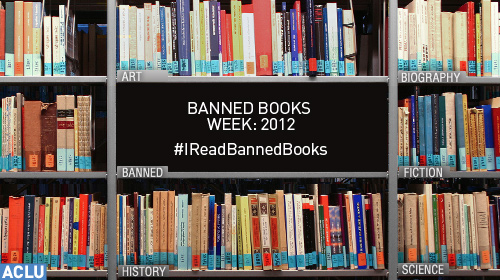
This week is marks the 30th anniversary of Banned Books Week, an annual event that celebrates the freedom to read and calls attention to the wealth of creative expression that is stifled when books can be barred from library shelves. The ACLU has always believed that our country functions best when citizens exercise their right to freely explore the world around them, and, we’ll be blogging about banned books and censorship all week. Join the conversation using .
Don't join the book burners. Don't think you are going to conceal faults by concealing evidence that they ever existed. Don't be afraid to go in your library and read every book, as long as that document does not offend our own ideas of decency. That should be the only censorship.
– President Dwight D. Eisenhower, commencement address at Dartmouth College, June 14, 1953
Seventeen years ago this week, cooperating lawyers recruited by the were doing battle for the First Amendment in a major trial over the Olathe, Kansas School District’s removal of Nancy Garden’s award-winning young adult novel from all of the District’s school libraries. Annie on My Mind depicts a fictional romantic relationship between two teenage girls. After a four-day bench trial, a federal district judge ruled that the Superintendent and the members of the Board of Education had removed the novel from the school libraries “because they disagreed with ideas expressed in the book and . . . [thus] intended to deny students in the Olathe School District access to those ideas.” (You can read the opinion in that case – Case v. Unified School Dist. No. 233, 908 F.Supp. 864, 876 (D. Kan. 1995) – ). The court’s decision was a ringing victory for the First Amendment rights of students to receive diverse ideas and information free from the clutches of censorious school officials.
Since then, the ACLU of Kansas & Western Missouri has fought library censorship on a regular basis with mixed results. For instance, in 2005, we encouraged the Blue Valley School District’s Board of Education (in suburban Kansas City) to reject a parent group’s petition to remove the following fourteen acclaimed books from the District’s curriculum: , , , , , , , , , , One Flew Over the Cuckoo’s Nest, , , and This Boy’s Life. In August 2005, the District announced that it would keep in the curriculum and would keep all of the books in its school libraries. Based on a District curriculum review process, school officials decided to drop Tobias Wolff’s This Boy's Life and Walter Dean Myers’ Fallen Angels because a review committee decided they were no longer the best fit for the curriculum. Although the parent group had challenged all of the books based on claims of “indecency,” the District’s director of curriculum and instruction said that no titles were removed because of violence, language, or sexual content.
In the last couple of years, we have tried but failed to stop efforts to remove books from school libraries in Stockton and Republic, Missouri. In both cases, the censors successfully advocated for removals of acclaimed literary works based on selective readings of the “dirty parts.”
In 2010, the Stockton School Board to remove Sherman Alexie’s award-winning novel, , because its teenage protagonist was dealing with his parents’ alcoholism on an Indian Reservation in Eastern Washington and with his own sexual awakening. The book offers positive messages of personal responsibility and resisting peer pressure, but those positive themes could not withstand the censors’ shrieks of outrage based on out-of-context quotations of the novel’s allegedly salacious details. Although we were interested in litigating the removal of the Alexi novel, the parents and teachers who spoke up against removal before the vote feared retaliation and would not agree to act as plaintiffs in a lawsuit against this rural school district.
Last year at this time, we – along with many coalition partners – were engaged in a heated battle to try to stop the Republic School Board from removing Kurt Vonnegut’s Slaughterhouse-Five and Sarah Ockler’s Twenty Boy Summer from the high school curriculum and library. The Board eventually from the high school’s curriculum and library in response to complaints filed by Wesley Scroggins, a local resident and Missouri State University business professor. In published in the Springfield News-Leader after the removal of Slaughterhouse-Five but before the removal of Twenty Boy Summer, Scroggins explained that he objected to Slaughterhouse-Five because it “contains so much profane language, it would make a sailor blush with shame,” and to Twenty Boy Summer because of its sexual content. Scroggins advocated additional removals of books with these closing words: “How can Christian men and women expose children to such immorality? Parents, it is time you get involved!” Although our coalition’s efforts failed to get the books back in the high school’s library, the Kurt Vonnegut Memorial Library sent 150 copies of the novel to students in the District, and the Republic Public Library reported a waiting list of patrons wanting to read Vonnegut’s great anti-war novel. Thus, the censors may have won the battle, but they lost the war.
And you can be sure that the – as well as ACLU affiliates around the country – will continue to defend the freedom to read for many years to come.
Learn more about banned book week: Sign up for breaking news alerts, , and .


